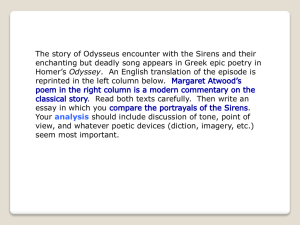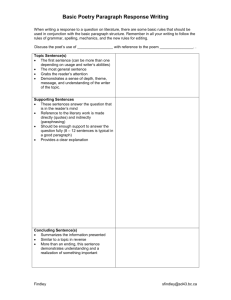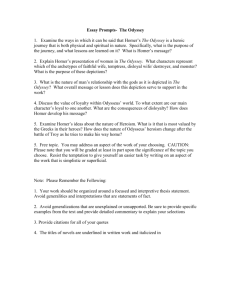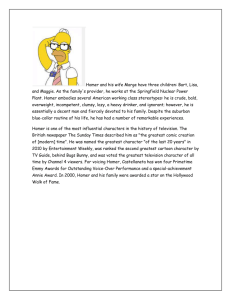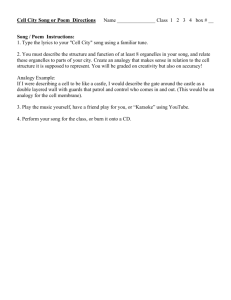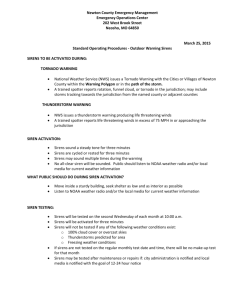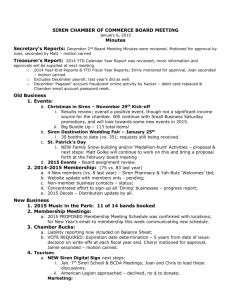Question #l-*Sirens' 2000-AP English: Literature & Conposition
advertisement
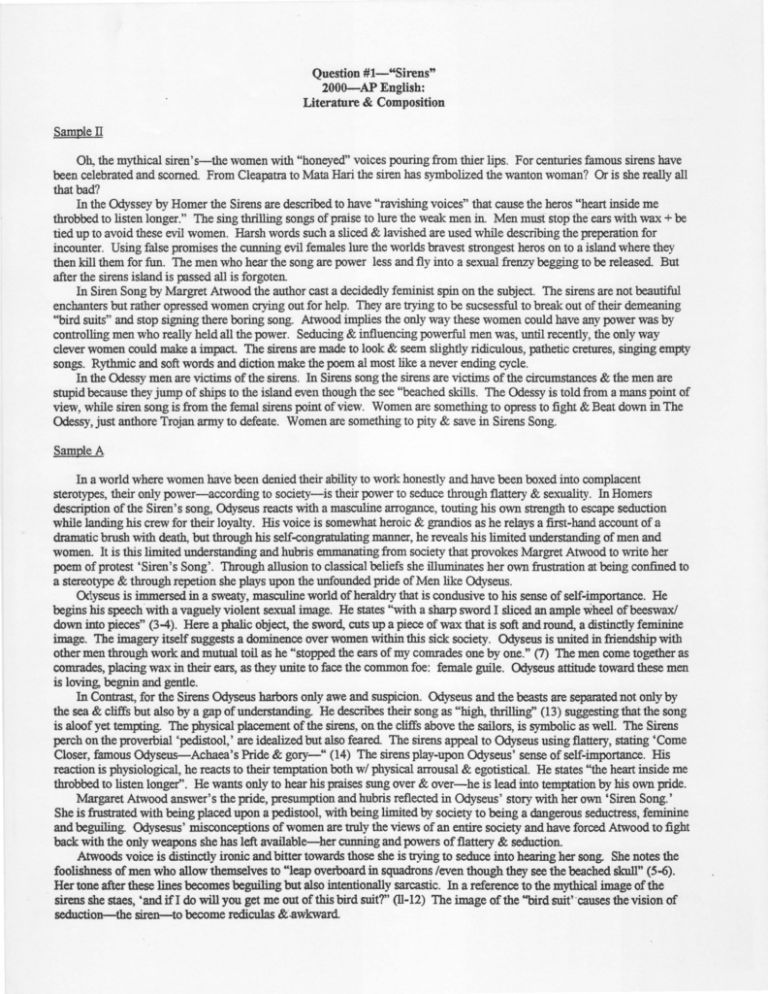
Question#l-*Sirens'
2000-AP English:
Literature & Conposition
Sampletr
Ob, the mythical siren's-the womenwith "honeyed"voicespouring from thier iips. For centuriesfamoussirenshave
beencelebratedand scorned-From Cleapatrato ldaa llari the sirenbassymbolizedthe wantonwoman? Or is shereally all
that bad?
In the Odysseyby Homer tbe Sirensare describedto have"ravishing voices" that causethe heros"heart inside me
throbbedto listen longer." The sing tbrilling songsof praiseto lure the weak men in Men must stopthe earswith wax + be
tied up to avoid theseeeil women. f{arsh words sucha sliced & lavishedare usedwhile descnbingthe preperationfor
incounter. Using false promisesthe cunningevii femaleslure the worlds bravestsEongestheroson to a islandwhere they
then kill them for firn. The men who hearthe songarepower lessandfly into a sexualfre,trzybeggingto be released But
after the sirensisland is passedall is forgoten
In SirenSongby Margret Atwood the authorcasta decidedtyfeminist spin on the subject. The sirensarenot beautifrl
enchantersbut rather opressedwomen crying out for help. They are tying to be sucsessfirlto break out of their demeaning
"bird suits" and stop signingthere boring song. Atwood imFlies the only way thesewomen could haveanypower was by
son6slling menwho really held all the power. Seducing& influencing powerful men was, until recenfly,the only way
clever womencould makea impact. The sirensaremadeto look & seemslightly ridiculous, patheticcretuires,singing empty
songs. Rythmic and soft words and diction raakethe poemal most [ke a nevsr ending cvcle.
In the Odessymen are victins of the sirens. In Sirenssongthe sirensare victinnsof the circumstances& the men are
snrpidbecausetheyjump of shipsto the island eventhoughthe see"beachedskills. The Odessyis told from I menspoint of
view, while siren songis from the femal sirenspoint of view. Womenare somethingto opressto fight & Beat down in The
Odessy,just anthoreTrojan army to ddeate. Womenare somethingto pity & savein SirensSong.
SampleA
In a world wherewomen havebeen deniedtheir ability to work honestlyand havebeenboxedinto complacent
sterotypes,their only power-according to society-is their power to seducethroughflattery & sexuality. In Homers
descriptionof the Siren's song,Odyseusreactswith a masculinearroganc€,touting his own saenglhto escapeseduction
while landing his crew for their loyalty. Ilis voice is somewhatheroic & grandiosashe relaysa fust-hand accountof a
dramaticbrush with d€ath,but through his self-congrtulating rnanner,he revealshis limited rmderstandingsf men and
women. It is this limited undersEndingand hubri5 ffnmnnatingfrom societythat provokesMargret Atwood to vrdts her
poemof protest 'Siren's Song'. Through allusion to classicalbeliefs sheilluminates her ovm frustrationd being confinedto
a stereot]'p€& througb repetion sheplaysupon the unfoundedpride of Men like Odyseus.
Glyseus is immersedin a sweaty,masculineworld of heraldrytbat is condr:siveto his senseof self-importance.He
b€einshis speechwith a vaguelyviolent sonul image. He states"with a sharpsword I sliced an amplewheel of beeswax/
down ido pieces' (3-4). Here a nhalic object, the swor4 orts up a pieceof wax tbat is soft androun4 a distinctly feminine
image. The imageryitself srggestsa dominecrceover womenwithin this sick society. Odyseusis united in tiendship with
othermen through work and muuul toil as he "stoppedthe earsof my comradesone by one.' (7) The meir cometogptheras
comrades,placing wax in their eaxs,as they uqite to facethe commonfoe: fEmaleguile. Odyseusattitudetoward theseme,n
is loving begnin and gentle.
In Conrast, for the Sire,nsOd:nseus
barborsonly aweand suspicion. Odyseusard the beastsare separated
not only by
the sea& cliffs but alsoby a gp of understanding He describestheir songas 'higt thrillingl' (13) zuggestingtbat the song
is aloof yet temlring. The physical place,nentof the sireirs,on the cliffs abovethe sailors,is symbolicaswell. The Sirens
perch on the proverbial 'pedistool,' are idealizedbut alsofeared The sirensappealto Odyseususing flauery, stathrg'Come
Closer,frmous Odyseus-Achaea's Pride & gory-' (14) The sirensplay-uponO$rseus' senseof self-importance.His
reactionis physiologica! he reactsto their temptationboth w/ physicaiarrousal& egotistical. He states"the heartinside me
tbrobbedto listen longet''. He wants only to hearhis praisessungover & over-he is lead into tempation by his own pride.
Margaret Atwood answer'sthe pride, presumptionandhubris reflectedin Odyseus'story with her own 'Siren Song.'
Sheis frustratedwith being placedupon a pedisool, with being limited by societyto hing a dangeroussedrcFess,fenrinine
and beguiling Odysesus'misconcepions of womenaretruly the views of an entire societyand haveforcedAtwood to fig[t
back with the only weaponsshehasld available-4er cunningand powersof flattay & sedrction.
Atwoodsvoice is distinctly ironic andbitter towardsthosesheis trying to sedrceinto hearingher song Shenotesthe
*leap overboardin squadrons/oren
foolishnessof men who allow themselvesto
though they seethe beachedsl$ll" (5{).
Her tone after theselines becomesbeguiling but also intentionally sarcastic.In a refereuceto the Eythical imageof the
'causes
sirensshestaes,'and if I do will you get me ort of this bird suit?' 0t-12) The image of the *bird nrit'
the vision of
se&rction-{he siren-to becomerediculas&,awkuard-
Atwood resortsto flattery of her readeras an ironic device-to prove how hollow the action is andto demonstrateher
resentuentat being thoughtof as merely a seductrss insteadof an inteltect. Shestates,'tt
to,t only to you',. (20) The
repetition of the word you makesthe readerfeel awkwardlyunimporanq & the readerb.g* to geti se* tnat Oey are being
panonized
Essentially,the first pasaageconveysa senseof machismo& hubris tbrough imagry and a grandiostone. This then
becomesthe motivadonfor the secondpoemwhich bitterly remonstratesthesefrlacious stereotvpes.
SampleHItrI
Thesetwo poemswritten aboutthe Sirensfrom the 'Odlrssey" canbe interpretedin two very diffent ways,yet they hold
gushsimilarity. The tone, point of view and diction aretbreevery importantpoetic dwices
to be examinedwneo Oisc'ssing
&e two differentpoems.
The tone of the first poemis cautiousand evenadventursome.@sseus know what the luring sirenswill do to hirn, so
he is taking precautionsby stoppinghis crew's sarsand rcking them to bind him. Qdysssusknowsb€tterthrn to let the
sirenstake over him. In the secondpoemby MargaretAtwood, the tone is much more a warning evena bit taunting.
The point of view of eachis a very importantdevice. In the fust poem,the poemis ftom Odysseus'point of viJw (fust
person)' He speaksof his experiencewhen passingthe Sirens. He feels the danger,he is scaredio be lured ir In the Sire'
Song,wealsoseeafirstpersonpointofview,butinsteadthistimethenarratoriittresiren
"Helpme!",(la}Z),thesiren
cries out as sheis webbingher next victimThereare two very difierent t5'pesof diction beingusedin thesetwo poexc,and that is what distinguishedthem from one
another. In the first poem,the vniter useswords lile strensth,ravishine,throtbe4 and thrilline to creirtea moreadventrnous
tone. On the other handin the "siren Song",Atwood useswords suchas irresistable,ggg lSa4qAgS,
andfatal again1e61""1"
a moretaunting and wer pertaps lugubrioustone.
SampleFFF
In the English translationof this episodethe SirensareporEayedas seductiveand mystical creifires. .'. . . sails on, a
wiser marL" indicatesttrat theyfeel like they are helping rren, howeverthey arejust luring them in the toneis a much more
fgsiti_veone than lvlargaretAtwood's poem. The poemportryesthe Sirensin needof help. 1'nesirenspretend.to be in need
ofassistanceand call out to any passingships.
The point of view also changesvaries. In the translationOdysseusis telling the story of how he heardthe siren's song
and lived to tell aboutit the portraSralis influencedby a man,who is the primary target of the sirens. In the poem,one of the
sirensis speakingabofi how shefeels aboutsi'rgng. Now it seemsthatthe sirensarethe onesthat needthehelp.
SamoleT
The mythical Sirensof Homer's QSES are often a gmbol for the influence of women on pining andlwesick men
-sirsri
Their tricks and tenptations are almost unavoidable. Suchis the casein the original story of the
io Homer's Odvssey
andin ldargret Atwood's 'Siren Song." The trro
rylo4g* poraay the Siren'sfrom the original point of view of OCysseus
andfromthe
pointofviewofoneofthesirens. Ihepoet'svariancesintone,pointofvie*,andimagerycreate
two contrastingviews of the nytlr
The ottting from the Odyssevsharesthe original tone of the work It is determined,shownthroug[ Od5nseus,
but also
pining. The detemdnationof Homer's pieceis shoqmthroughthe measurestakenby Odysseusand his crewto resistthe 1ue
of the sirens. The Ilhican warrior "stoppedthe earsof [his] comradesoneby one," in hiiattemp to shieldthem from the
rntalizirrg song Likewise, the ctew bound him to the mastso that he could hearthe songwithout
harm. As the Sirensbegin
to sitg, Odysseus'tone chaogesto one pining to stopthe ship and longing to staywith Ai Ueautifirlvoices. His men,
howevet,still determined,*[bound him] fasler, with rope on chafingrope." While the tone of this passagecent€rsati ,oa
strcngthand resistance,in Atwood's poem,the tone is cjm.icaland uninterested-The Sfu€ntells th,ereadir *I don,t enjoy it
here.' Shebelifles her fellow singersssd elainrstbat the listnsr is "uique." However,tlre tone ctrargesin the last itan a.
Wherethe speakerhad Pwiously shown a cymcal look at her daily occupation,here shechangesto a-tooeof satisfustionas
shebascoaxedin anothermen "at lasl"
Sincethe point ofview in Homer's epic is that of Odysseus,his male desiresandvunerablestatedominetethe passage.
He hearsthe Siren's songasthe most beautiful soundin the worQ without their protection,Ocysseusandhis -eo are
powerlessagainstthe Sirens'call. Odysseus'point ofview is on the defensiveside ofthe story In *Siren Songl, the
taralizer usesher femininity to oftalt a "poor me" *tiude which sheusesto her advadage. Odysseusfeels .ttj neart inside
ne ttlrybl to list€ll longer," brs the Sirenclaims "I don't elrjoy singing,' ard rallies her listenerto help her off of the istandHer point of view is carcfirlly plannedand monotonous,brutas shecapnres yet anothersailor tbrolg[ her tric1ery, shetells
&e reader'it worb errerytime."
The imagery of both piecescreatesa sharpcontrastin the portra)at of the Sirens. The dangerof the creaturesis
empbasizedin the Odvsseyas the me,n"flung themselvesat the oarsandrowed on harder,"to preventOd5nseusfrom
following their'honeyed voices" to the shore. The crew figbrs to avoid *their higb, tbrilling song." The Sirem,however,
crqrt€s an imagesof safetyas sheclaims sheneedssomeoneto 'get me out of this bird suit." Sheadmitsthat the island is
"picturesEre and mythical" but insist that her cohortsare "feathery maniacs." The imagesAnrood createsare intendedto
assuresafetyto the Siren" unsuspediry victim.
Thesetwo portrayalsof the mytical SirensinHomer's Odvssevand Afivood's "Shen Song" are sharplycontrasted
tbrougb the use of point of view, tone, and imagery. As the contasting views of male andfemale develop,the "weaker sex"
is glorified by upsettingthe male's tnrst and prevailing
Sampie)C(
Poemsare often vritten asre,flections.They can rdect ideas.occr::rences,or eveneachother. N{argaretAtwood's
*SirenSongi'andpartofHomer'sOdrssevbothreflectonthesongofthesirensofGreelcmythology.
However,thepoem"
eachappoach their subjectfrom different points of view and with different tonesand diction.
In llomer's Odvssev,Odysseusmolds wax with his hands"to seal [his men's] ears." He himself is tied tigbtly down so
he will be physically unableto folow the siren's sweetvoices. The menrow on as Odysseusis torturedby the song. Only
after they are far pastthe sitetr's land camehe be setfree. Convenely, in Atwood's poem-the readeris askedif he or she
would like to leam the sougtbat no personcanresist The readeris aske4 in exchangefor hearingthis sweetsong if he or
she will setthe speakerfree. He or shewill be the only personto know the song and althoughit is *bo'i"g" "it works wery
tine."
The two poemstell a similar story,but from very different points of view. Homer's poem is viritten in third person It
tells the tale of Od5nsseus'
stnrggleaginst the ternptationof the Sirens. The readeris not drawn into the action, but merely
an obsen€r. However, Atqnod's poem drawsthe readerinto the event It is written in first person,using pronounssuchas
"f' and *you.' This poem is askingthe readerdirectly if thEywill listen to the song The speakeris a siren attsryting to lrne
anotherpersoninto her world The readerfeels morea part of the action and experieucessomeof the temptationOd5nsseus
felt. Thougb, the poemscontain similar messagesof tempatio4 Atwood's poemis more effectivebecauseit allows the
rcad€rsinto the action and portrap the sirensas more deviouscreatures.
In addition to contr:astingpoint of view, the two poemshavedifferent tones,as well. Odvssevis written in amore
dlamatic Inanner. The situation surroundingOdysseus'resistanceto the songis described Homerwrites of "the Sirens
[sensing]at orce a Sip. . . racing pastand [bursting]into their higb, tbrilling son." Odysseusstrainsto break ftee, but is held
and forced to resist. The overall tone of Homer's poemis very dramatic. Couversely,Atwood's poemis extremely
nrysterious. The songis describedas *secret' No one knows the song*becauseanyonewho hasheardMs dea{ andthe
others can't temember." The poemis a little elusivebecausethe readerneverknows what is going to happe,n The tonesof
the t'wo poemsporfray the Sirensas dranr,aticin oneversion andextremelymysteriousin the oths.
As well as tmiquetonesand poids of view, O4yssw and *Siren Songl'eachemployunique diction. Odyss€Vcontains
more imagery and descriptivewords in pornaying the sirens. Their voicesare describedas"honeyedvoices poruing from
[theu] lips." The q/ordschosenby Homer are soft andflowing. As O$mseuslistens to the song "tb€ heartinside him
tbrobbedto listm lmga." In 'Siren fungl Afwood usescontrastingwordsto enrphacizethe power of the sirens. The fiffh
stanzasecmsodd asit says,'I don't enjoy it here . . this islandlooking picturesqueand mythical." Also, the readeris told he
or sheis unique multiple times,but the last line states,"it worlcseverytime." In Atwood's poenq the sirensarepocral'ed as
confusing and t€nslous throughthesecontrastirg words.
Odvsseyand *Sireir Songi pornay tbe sirensdifferently throughthe useof unique point of view, tong and diction
SampleCC
Both Homer and Atwood porray the sire,nsin s similar mznner. Their mutually uniquemethodssharecommontone
towards their subjects. Both authorsporbay to the rcaderthe sirensasdeceptiveand flarering
Homer tells his story in first personthroughthe eyesof Odysseus.His porfrayal of the sirensis thus subjectedto the
views of Odysseus'character. The tore of the passageis fearfirl and suspenseful.We are shownthe fear of both Odysseus
and his crew. Any force which instills tbe desireto be bound to a ship's mastfor fear of its seducingnatureis indeeda
frightful idea The passageis given a hint of suspensewhen we are madeto wanderwhat will becomeof Odysseusandhis
crew. WilI the crew disobeyhis ordersanduntie him? Their absolutefear of the situationis shovmagainwhen "they flung
themselve.sat the oarsand rowed on barder."
Homer showsthe natureof the sirms throughtheir song His diction showshow they flatter Odysseus.They call to
hint, dsscriling the taits he aspiresto the most: thoseof the hso. They call "famous Odysseus"andlabet him s[6[2s3's
pride and glory,' andtheir songis *thrilling.' Who would not be tbrilled to be famousand all the ravein you homeland?
Atwood paints for rs a sirnilar porcait for th€ sir€ns. Shetoo writes in the first person,hlt shetakesthe role of a siren
herself. By doing this, the poen becomesthe Siren's song malcingit aptly titled Atwood showstle sirens' tickery by not
showingthe audiencetbat the siren is actuallyusing its charrring songuntil its too late. Shetoo flatters the iistenerwith her
diction The word "you" is usedoften asthoughto askfor "help." Shecriestbat "only you" canhelp, "only you. . . .. and
flattersmore by saying"you aie mique." By meking herselfseemhelpless.Atwood's speakerseducesevenmore. The
audienceis madeto feel sorry for the sire,n.Sheis not wil, just misundersloodwe shouldgo to her and help her. Therein
Iies the trickery. Sheusesher flatering diction to counterwen her own negativeimagery(the fearful "beachedslilll" even
we aremadeto ignore).
Both authorsportraythe sirensasfearfi:l, yet seductive. To submitto their beautifiri songis to die, but who could resist?
The mighty Odysseusevenis asf immnns,andwe the readertoo aretricked, despitehow clever we are.
SampleB
hedator & Prey
Homer and Atwood presentthe compiexityof the myth of the Sirensthrough different points of view, with different
tones,and telling imagery. Homer tells the story of a manclwer enoughto hearthe siren's songandnot losehis life, whjle
Atwood is a siren,a predator,waiting to trick men on to her island.
The tonesof the passages
are quite different In both worls, however,trickery and clevernessis used- Odysseusescap€s
with his life, and the sirenwins, saylng"AIas it is a boring songbut it worls werytime.' The tonein Homer's passageis
strongandpowerfrrl. "Now with a sharpsword . . Helios' buming rays. . .shipwas 1scingpasf" arephrasesusedto illusuate
fhis tone. However, asHomer's tone hasmasculinequalities,Atwood's hasfeminine ones. Her tonais crafty, thenpleading
*Comecloser. help
..
me! Only yort' only you can' ttre sirenscreams,pleadingfor attention Thesetwo passagesare tite
two halv€sof a whole. Od;rsseus
is prey, tying fiantically to escapedeatb.while the sirenis a carnivorouspredator,singlg
for her sqpper. The teryo of the trro passilgesis also quite different Homer's is Erickea like a scurryinganimel,while
Afwood's is deliberate. Atrrood evetrusespmctuation to her advantagein the last tbreestanzas.The last line of eachstalza
is broken,forcing the teader'seyeto the ne:d stanzawithout realizingthe frickery. In the sameway the Sirenslure meninto
thereclEches,Homer qplitshis passageinto threesectionsaccordingto the crew's state: at first they are sailing then
preparing and finally escaping.
The imageryin both passagesis also quite different andrevealing. Homer's words arenr(culine, powerful, and battle
ready. He useswords like "sharD,""sEengtb,""srong" "hands,""chume4" "Iacing" "sharpe'word-"The imageryis that of
a rnanwho is not onlysailing by the Sirens,but going to war with them. Homer descdb€sthe Sirens'songas "1xyishing,"
*hig&,""thrilling;"&"trg-nt"
TheirvoicesmakeOdysseus'hearttbrobandtherealnostisasenseofsensualitytakenfrom
this inagcy. Atwood's iaagery is far from masculineandlesssexual. The words 'tird suit' and "squatting' almostgive
the of a ridiculous situation- However,'feathery menisss' and "fatal andvaluable" give off a more seriousimageanatone.
The imagerymakesthe readeridentify and feel pity for this poor sire,rlfor shebateswhat sheis. By the end of her pleading
the readerbasbeensuckedin, like the menwho "leap overboardin squadrons"mentionedin the first sanza. The poem
beeinssedrctively menacing thenbecomesalmostwhiny and innoced, andfinally endswith the samegraveeand clever
(fatal ) tone.
Thesetwo passages6as[ sing the songof oposing sides,yet they havemuch in commorl They both usetrickery to
escapeor catchthet kill, andthej both areconfidentin their abilities exceptfor equalmomentsof weakness(Odysseus
beeginghis men to untie hinl Sirennot "enjoying it here.. I don't enjoy singng) in both passages.yet the two s-ongsarethe
natrJralg6ngsof an animal andits hunter.
